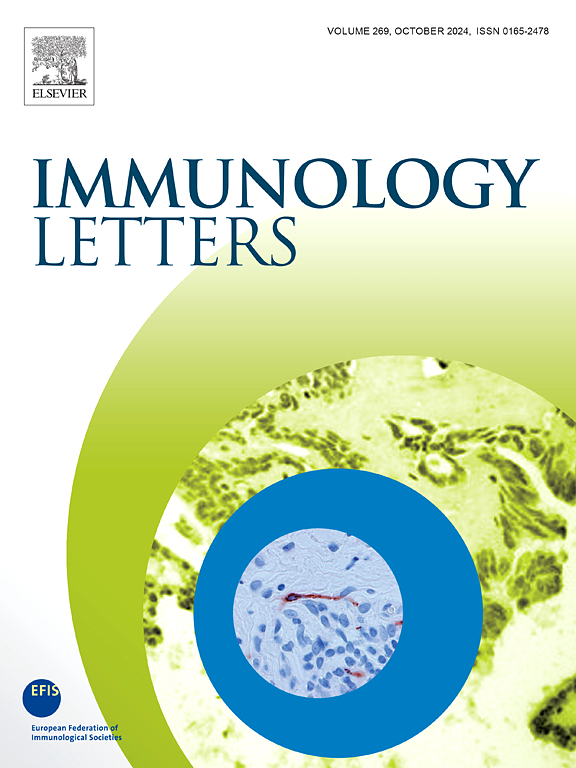可溶性 CTLA-4--基于 CTLA-4 的癌症检查点免疫疗法的干扰因素。
IF 2.8
4区 医学
Q3 IMMUNOLOGY
引用次数: 0
摘要
细胞毒性T淋巴细胞相关抗原4 (CTLA-4)是一种抑制T细胞活性的受体。CTLA-4基因由四个不同的外显子组成,通过选择性剪接可以产生四种不同的CTLA-4同种异构体。尽管sCTLA-4可能会阻碍抗ctla -4治疗的治疗效果,但sCTLA-4在肿瘤微环境(TME)中的作用尚不清楚。在此,我们对sCTLA-4在TME中的抑制特性提供了新的视角。本文章由计算机程序翻译,如有差异,请以英文原文为准。
Soluble CTLA-4 – A confounding factor in CTLA-4 based checkpoint immunotherapy in cancer
Cytotoxic T-lymphocyte–associated antigen 4 (CTLA-4) is a receptor that inhibits the activity of T cells. The CTLA-4 gene consists of four different exons that enable four different isoforms of CTLA-4 to be generated through alternative splicing. Although sCTLA-4 might impede the therapeutic effect of anti-CTLA-4 treatments, the role of sCTLA-4 in the tumor microenvironment (TME) is not well understood. Here, we provide novel perspectives on the inhibitory characteristics of sCTLA-4 in TME.
求助全文
通过发布文献求助,成功后即可免费获取论文全文。
去求助
来源期刊

Immunology letters
医学-免疫学
CiteScore
7.60
自引率
0.00%
发文量
86
审稿时长
44 days
期刊介绍:
Immunology Letters provides a vehicle for the speedy publication of experimental papers, (mini)Reviews and Letters to the Editor addressing all aspects of molecular and cellular immunology. The essential criteria for publication will be clarity, experimental soundness and novelty. Results contradictory to current accepted thinking or ideas divergent from actual dogmas will be considered for publication provided that they are based on solid experimental findings.
Preference will be given to papers of immediate importance to other investigators, either by their experimental data, new ideas or new methodology. Scientific correspondence to the Editor-in-Chief related to the published papers may also be accepted provided that they are short and scientifically relevant to the papers mentioned, in order to provide a continuing forum for discussion.
 求助内容:
求助内容: 应助结果提醒方式:
应助结果提醒方式:


